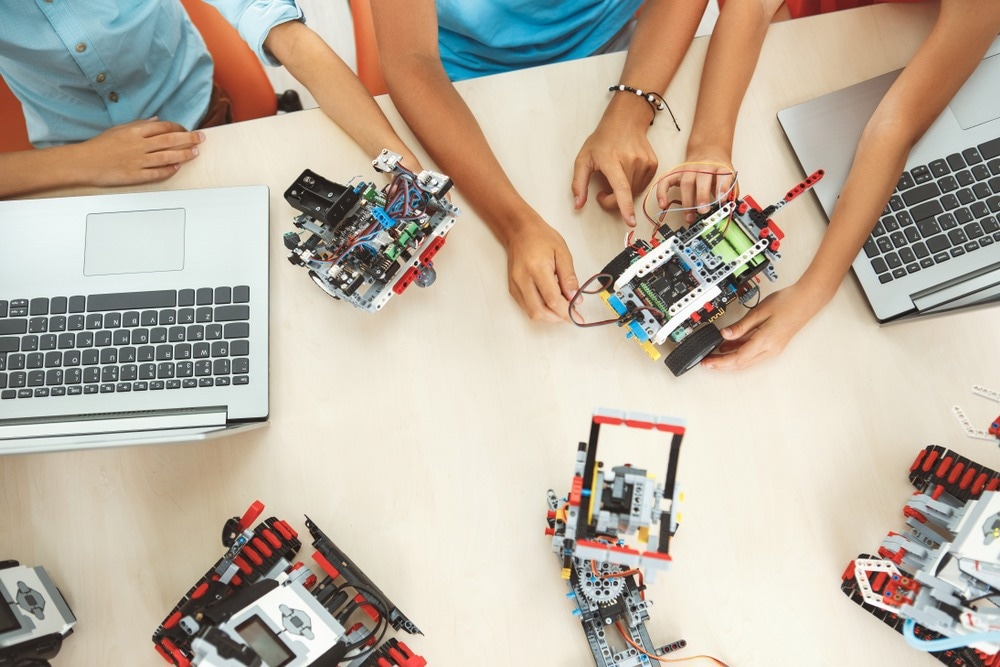With events, activities, and resources put out in the first week of April, 2023, American students are being shown the variety of robots in use today and their applications in nearly every industrial sector.
The organizers say that few fields combine a mixture of engineering, creative, and problem-solving skills in a single domain as much as robotics. Consequently, facilitating resources in robotics and STEM (science, technology, engineering, and math) education provides opportunities for all to take part in the excitement of robotics innovation.
Through the dissemination of robotics events and activities, their objective is to debunk the mystique surrounding robotics and enable individuals to be galvanized by the extensive prospects that STEM skills can offer.
To do this, 64 events are being held in every US state in the first week of April. These workshops, visits, skills challenges, and valuable industry insight events are hosted by robotics companies, schools, colleges, scouts clubs and museums. They inspire innovation skills in audience groups spanning early education, elementary, middle school, high school, college, and professional stages.
Robotics Industry Needs
Robotization and the development of artificial intelligence (AI) are global technological megatrends, propelling the rapid advancement and soaring demand for robotics. Robotics, being a technology integrator and supplier, is closely linked with the development of modern electronic components, automation hardware, and high-speed communication networks.
This swift technological expansion is evident in the flourishing industrial and service robotics markets worldwide. The global supply of industrial robots has almost doubled from 159,000 in 2012 to 294,000 in 2016 and surged to 422,000 robot installations in 2018, with an estimated annual growth rate of 12% from 2020 to 2022.
The continued proliferation of robotics worldwide necessitates a workforce capable of creating and sustaining these advanced devices, requiring a diverse range of skills and knowledge in robotics professionals to cater to its various applications.
Robotics and AI
With the remarkable progress of robotics and artificial intelligence (AI) technology, there has been renewed scrutiny of its effects on jobs and the economy. AI development is a good example of the wide range of skills required in the workforce for the robotics industry of the future.
National Robotics Week champions Google's AI Experiments as a valuable learning resource to ignite interest and enhance skills in AI innovation. AI Experiments serves as a gateway to unleash one's potential in machine learning via straightforward experiments that utilize images, drawings, language, music, and beyond.

Image Credit: Viktoriia Hnatiuk/Shutterstock.com
Skills for Industry 4.0
Policy-makers across the globe are confronted with the challenge of enhancing skill provision systems and updating education policies, with a focus on rapidly augmenting skill levels for individuals of all ages. This involves prioritizing both STEM (science, technology, engineering, and mathematics) and non-cognitive soft skills.
Critical institutions, such as labor supply, education and training, and skill development, pave the way for technological advancements in high-value industrial fields like robotics.
Robotics industry skill sets – for example, in advanced manufacturing, engineering, data science, automation, and research and innovation – will be in demand increasingly as we shift into the so-called “Industry 4.0” or Fourth Industrial Revolution paradigm.
Industry 4.0, also known as the Fourth Industrial Revolution, is a technological transformation that has been reshaping the manufacturing industry. It involves the integration of digital technologies, such as the Internet of Things (IoT), AI, big data, and robotics, into every aspect of the production process.
Industry 4.0 seeks to create "smart factories" that are more efficient, flexible, and responsive to customer needs. This requires a shift towards decentralized decision-making, real-time data analysis, and autonomous systems.
The goal of Industry 4.0 is to create a new era of manufacturing based on technologies that produce enhanced productivity, lower costs, and increased competitiveness.
Researchers recently identified 13 key technologies whose development was intrinsically linked to Industry 4.0. These were the Internet of Things, Big Data, 3D printing, cloud computing, virtual and augmented reality, cyber-physical systems, smart sensors, simulation, nanotechnology, drones, biotechnology, artificial intelligence, and autonomous robots.
Industry 4.0 brings with it not just new approaches but also methodologies and technologies that must be introduced into companies. However, the transition to such sophisticated production is not immediate, as high financial costs and a lack of skills in the workforce pose significant barriers to the widespread adoption of these technologies.
To build the skills needed for Industry 4.0, new curricula must be developed, particularly in fields such as industrial and mechanical engineering, that incorporate Industry 4.0 infrastructures. This evolution in the education system, known as Education 4.0, integrates technology into nearly every element of didactic education, enhancing learners' ability to apply new technology and empowering them to produce innovations and creativity that align with societal changes.
The National Robotics Week initiative is doing just this: harnessing industry with education to foster the skills development that will lead to robust, high-value industrial activity in the long term. This can help us to create the efficient, productive, and sustainable economy that our future needs.
References and Further Reading
Benešová, A., and J. Tupa (2017). Requirements for Education and Qualification of People in Industry 4.0. Procedia Manufacturing. doi.org/10.1016/j.promfg.2017.07.366.
Bongomin, O., et al (2020). Exponential Disruptive Technologies and the Required Skills of Industry 4.0. Hindawi Journal of Engineering. doi.org/10.1155/2020/4280156.
Leigh, G.L., et al (2020). Robots, skill demand and manufacturing in US regional labour markets Get access Arrow. Cambridge Journal of Regions, Economy and Society. doi.org/10.1093/cjres/rsz019.
National Robotics Week. [Online] Available at: https://www.nationalroboticsweek.org (Accessed on 6 April 2023).
Shmatko, N., and G. Volkova (2020). Bridging the Skill Gap in Robotics: Global and National Environment. SAGE Open. doi.org/10.1177/2158244020958736.
Disclaimer: The views expressed here are those of the author expressed in their private capacity and do not necessarily represent the views of AZoM.com Limited T/A AZoNetwork the owner and operator of this website. This disclaimer forms part of the Terms and conditions of use of this website.